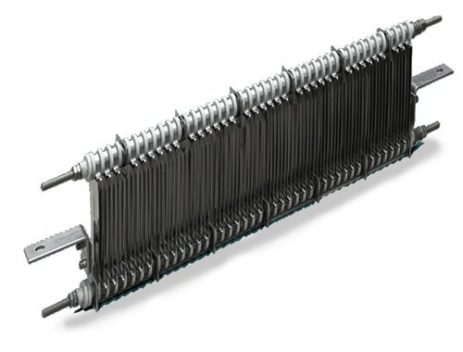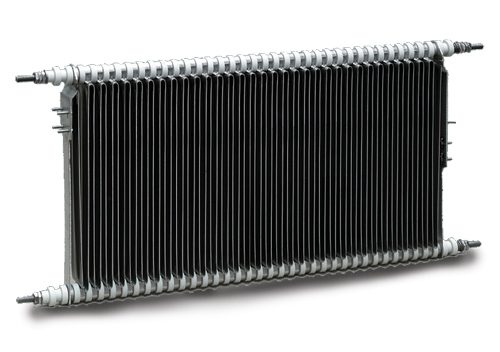- EMAIL: SALES@CRESSALL.COM
- • TEL: +44 (0) 116 273 3633
EDGE-WOUND COILS
- Stable high temperature resistance alloy for reliability
- Rated for repetitive duties and high short term overloads
Cressall’s edge-wound coiled strip resistors are an efficient way to package a large resistance mass into a small space. The high mass and robust design provides exceptional short term overload capacity.
All styles are manufactured from a continuous stainless steel strip wound edgewise to form a coil which is then fitted on ridged ceramic insulators and supported on a central steel support strap.
Elements can be supplied either loose, as banked assemblies or mounted in a range of standard ventilated enclosures, according to customers’ requirements.
For very high current ratings such as those in earthing resistors RP edge-wound coil is an ideal solution. The construction allows free expansion and contraction at operating temperatures up to 1000°C without imposing strain on the assembly.
ZC elements can be supplied with fixed resistance taps or adjustable tapping clamps to alter the resistance value.
WIRE WOUND COILS
- Stable high temperature resistance alloy for reliability
- Rated for repetitive duties and high short term overloads
- Low Inductance
- Negligible Noise
A compact and economical solution for high resistance and low power applications. Elements are usually manufactured using chrome-aluminium or nickel-chrome wire wound on to ceramic formers.
Elements can be supplied either loose, as assemblies or into a range of standard ventilated enclosures.
EXPANDED MESH
- Versatile element configuration.
- Excellent heat dissipation
- Light weight
- Low inductance
- Wide range of resistance alloys
Cressall’s expanded mesh elements can be designed with almost any configuration of element length, cross-section, material thickness and mounting arrangement.
The open construction of the elements allows unrestricted air flow over the elements making them particularly suitable for naturally cooled applications. Having a very large surface area relative to their mass, they have excellent heat transfer capabilities making them ideal for both natural cooling in continuous duties and duties with frequent on/off duty cycling, as they can cool from 600°C to almost ambient temperature in approximately 6 times quicker than the time taken by an average stamped grid element.
In tests up to 1MHz, expanded mesh resistor elements have very low inductance and they have been demonstrated as having virtually no inductance change for all normal practical purposes.
Expanded mesh elements are robust and capable of withstanding vibration, yet sufficiently flexible for shock absorption, the resistor elements are supported on fixed mountings, any element movement due to thermal expansion will be absorbed within the mesh structure itself.
The open construction of the elements allows unrestricted air flow over the elements making them particularly suitable for naturally cooled applications, negating the need for cooling fans and as such any associated noise attenuation or air flow monitoring.
LIGHT WEIGHT
Expanded mesh elements and their mountings are lighter in weight per kilowatt than any other known type.
NEGLIGIBLE INDUCTANCE
In tests up to 1MHz, expanded mesh resistor elements have been demonstrated as having virtually no inductance for all normal practical purposes.
DURABLE CONSTRUCTION
Expanded mesh elements are robust and capable of withstanding vibration, yet sufficiently flexible for shock absorption.
Elements have the advantage of fixed mountings: movement due to thermal expansion is absorbed within the mesh structure itself.
Although the heated part of the element and the metal supporting it are formed from a single sheet, heat is kept out of the mountings, terminations and supporting insulators to a much greater extent than with other designs.
Electrical insulation consists of insulated tubes and ceramic spacers to permit operation at any required voltage level.
STAMPED GRID ELEMENTS
HPR & HG GRIDS
- Versatile, robust construction
- For continuous and short-term ratings
- High ratio of surface area to active mass
- Wide range of resistor materials
HPR and HG grids are versatile plate style resistors available in a range of different resistance alloys, they are ideal for medium and high power electric braking, neutral earthing and load testing. The flat plate construction means fan assisted cooling can be offered for higher power applications.
The electrical connections between elements are double bolted. This allows removal of an individual element from the assembly without disturbing the complete arrangement.
SERVICE GRIDS
- Modular
- Shock and vibration resistant
- Range of standard enclosures
- Specifically designed for motor control
Service grids are a robust flat plate style of resistor manufactured from 304 grade stainless steel elements insulated using mica and welded together to form a continuous low inductance resistance path.
Service grid resistors can be supplied as either open banks or housed in ventilated enclosures.
Every grid has punched holes within the welded contact section to give intermediate tapping points.
STRIP ELEMENTS
Strip Type elements including Hi-temp, Eurostyle and EHT all have the following features:
- Modular Construction
- Ease of assembly/disassembly
- Unique element profile
- Two levels of primary insulation
- Corrosion resistant construction
- Lightweight, relative to loading density
- Shock/vibration proof
- Natural convection or fan cooling
Cressall’s Strip Type Resistors were developed for use in extreme operational conditions including severe shock and vibration, adverse weather, corrosive environments, extremes of temperature, and high overload margin,
Originally developed for use in rail traction market they are now also used in off shore marine braking and load testing.
Resistor banks are made up of a single row of “serpentine” shaped elements the ends of adjacent elements for Hi Temp and EHT are spot-welded together to form a continuous path or for Eurostyle a continuous element with no welds between the terminals.
Two rows of ceramic insulators are employed as the main supports for these elements. This method of support provides discrete accommodation for thermal expansion while providing excellent security against damage through vibration or shock.

HiTEMP

EUROSTYLE/EHT
INSULATION
All designs of resistor bank are insulated from the mounting rods using a combination of silicon bonded mica tubes and non-hygroscopic ceramic insulators, chosen to provide superior levels of both thermal and mechanical shock. These insulators are in a constant state of controlled compression either through tension springs or torque levels applied to fasteners, with no shearing effects, and will withstand levels of vibration and shock without damage.
The insulator mating faces have either a spherical shape that acts as a bearing face or are interlocked permitting movement in service while avoiding the creation of crevices which could result in contaminant ingress. A thin tube of high temperature, silicon-bonded integrated mica is employed between the ceramic insulators and the mounting rods to enhance the electrical insulation under the most adverse conditions.
